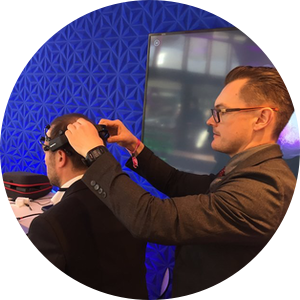Discover science-based strategies to unlock individual and team potential.
When leaders are looking for science-based tools to take their performance and organisational impact to a new level, they turn to Human Performance Scientist James Hewitt. Combining first-hand experience as a full-time racing cyclist with over 15 years of ground-breaking work and research, proven on Formula 1 tracks and Fortune 500 companies, James integrates endurance sports strategies with cutting-edge insights from neuroscience, physiology and organisational psychology to reveal a future where wellbeing fuels business success.


What if leaders did not have to choose between wellbeing and business performance?
Did you know leaders who sleep for seven rather than five hours are rated as more inspirational and charismatic, potentially boosting employee productivity by up to 225%? And what about enhancing creativity, which is ranked as one of the most critical skills in the future of work? It could be as simple as taking a stroll: 80% of brain grey matter is modifiable by physical activity, and a short walk outside can double the likelihood of generating an innovative idea. Even shifting company wellbeing by a single point could increase annual profits by $2-3 billion yearly. Sometimes, the most important work doesn’t look like work.
James’ award-winning keynotes positively impact and delight global audiences.
James’ has shared his thought-provoking and practical, science-based messages with audiences in over 30 countries, spanning sectors including aerospace, technology, finance, consulting, and pharmaceuticals, in leading business schools such as IMD, St. Gallen, and at three World Economic Forum Annual Meetings in Davos.

Book James for your event
If you would like to find out if James is available to speak at your event, please complete the speaking request form, and we will get back to you right away.
